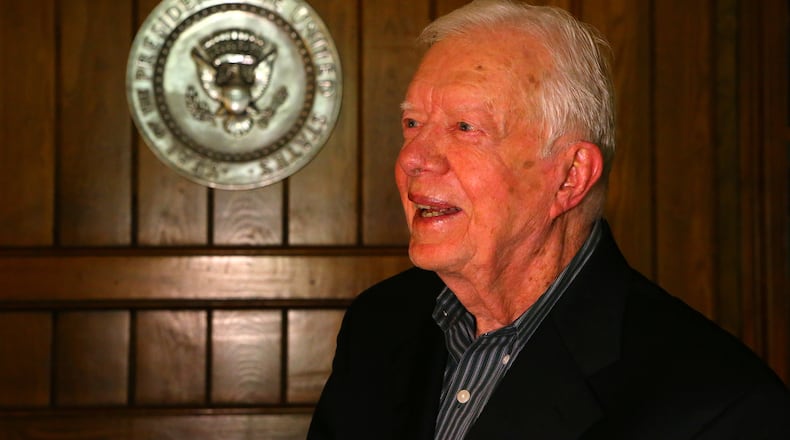Former President Jimmy Carter praised Barack Obama's decision to end the Cold War-era standoff with Cuba after a half-century of hostility.
The Georgia native called the fellow Democrat's decision to re-establish ties with the Communist nation "wise and courageous" and highlighted his own efforts to thaw relations between the two countries in the 1970s.
Here's his full statement:
I am delighted with the wise and courageous decision of President Obama to improve relations with Cuba, and congratulate Alan Gross and his family on his freedom. I hope the U.S. Congress will take steps to remove the economic sanctions against the Cuban people, which have proven to be ineffective in furthering democracy and freedom. As president, I lifted travel restraints on U.S. visitation and approved the opening of interest sections in Washington and Havana, in which hundreds of representatives of our two countries continue to serve. Full diplomatic relations will contribute to easier and more productive communications.
Obama said he expects "honest and serious debate about lifting the embargo" in Congress. In the Senate, that will go through the Foreign Relations Committee -- which as of January will have both Georgia senators on it.
Georgia Republican U.S. Sen. Johnny Isakson called this afternoon to say the day's news gave him uneasy memories of being at the University of Georgia during the Cuban Missile Crisis, ready to serve if called upon for World War Three.
Isakson said he was "delighted" at the release of Alan Gross and he hoped that the U.S. had not traded spies for him, because Gross should be a humanitarian prisoner released unconditionally. After Obama mentioned possibly taking Cuba off the state-sponsored terrorism list, Isakson said "I want to know what’s happened to take them off the list."
As for lifting the trade embargo, Isakson said he looked forward to full briefings with top Obama administration officials on Capitol Hill. Isakson is wary of any deal that "may have the inspiration of desperation," given that plummeting oil prices have hurt Venezuela -- Cuba's "sugar daddy," in Isakson's words -- on top of U.S. sanctions.
"We need to make sure that any agreement done with the Castros is done in ink, and not invisible ink," Isakson said.
Tellingly, Isakson said he would listen most to U.S. Sen. Marco Rubio, R-Fla., who is Cuban American and represents the influential Cuban American community in South Florida. And Rubio's statement does not mince words. A taste:
"As a result, America will be less safe as a result of the President's change in policy. When America is unwilling to advocate for individual liberty and freedom of political expression 90 miles from our shores, it represents a terrible setback for the hopes of all oppressed people around the globe."
Atlanta Democratic U.S. Rep. John Lewis is on Carter's side, in support of Obama's move. Lewis' statement:
"Cuba is one of our neighbors. It is only 90 miles from our shores. We work with the Russians. We work with the Vietnamese, we work with China and many other nations that we have had difficult relationships with in the past. At this point the embargo against Cuba is out of date. It relates to the politics of another time and another period in the history of both nations. This is now the 21st century, not the 20th century. To move into the future, we must learn to live together and work together as members of the community of nations."
About the Author


